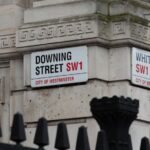April is the cruelest month, said TS Eliot. It certainly was for overseas property hunters as the mid-April highs of $1.45 and €1.16 fell away dramatically to the lowest rate since January. Could this be the start of a torrid few months? Is it possible that the pound could fall further?
The pound weakened by over seven cents against the US dollar and over 2.5 cents against the euro in April. As if this wasn’t bad enough news, the signs are that it could be the start of another summertime slide for the pound. You may remember that the last two years the pound also fell by more than 5% between spring and summer due to political and Brexit problems.
So what is the risk that the pound could fall significantly? There are three “downside risks”, as they say in the currency markets. These are interest rates, politics and the economy. We will get an answer to the first of these next week, when the Bank of England’s Monetary Policy Committee (MPC) meets to agree an interest rate increase, or not.
Interest rates
A rise in interest rates will generally strengthen the pound, as money pours in in search of higher returns. The prospect of a rate increase after the next MPC meeting on 10th May was believed to be practically nailed on in mid-April. That was until the release of the disappointing economic data. The British economy grew by just 0.1% in the first quarter of 2018. This was the weakest period of activity in more than five years. Bear in mind that the Bank of England has never raised interest rates when the latest estimate of GDP growth has been below 0.4%.
The Bank of England has never raised interest rates when the latest estimate of GDP growth has been below 0.4%.
The rumour has already hit the pound, but the actuality could be much worse. On 10th May we will learn not only whether there will be an immediate rise in rate, but also whether they are more or less likely to rise throughout the year. If not, we could see a rush of investors out of the UK and a falling pound.
The economy
Britain’s economy slowed to a virtual standstill in the first three months of the year. But is that a permanent malaise or a blip? Since the Brexit vote the debate over the UK’s potential future success has basically revolved around, “Hey, we’re still doing fine!” versus those saying “Brexit hasn’t happened yet, just wait!” Could this summer make it clearer if the UK economy will weather Brexit or take a soaking?
Brexit
Yes, it all comes back to Brexit. Remainer Amber Rudd has left the Cabinet and her replacement Sajid Javid showing no willingness to stay within a Customs Union, which makes a harder Brexit seems more likely. Where does that leave the UK’s negotiation strategy?
Managing risk
For anyone planning a property purchase this summer, these could be worrying times. A fall of 5% in the value of the pound means that a property will cost you thousands more. And we could be in line for an even larger fall. Fortunately there is another option to property buyers. Organising your currency is all about risk management.
With just days to go until the Bank of England policymakers cast their vote, what can you do to manage this risk and protect your budget? Smart Currency Exchange has a range of tools to help you do just that, including a Forward Contract.
With this type of contract, you pay a 10% deposit and set the rate for up to a year. This completely removes the risk and worry out of your purchase. It’s ideal for overseas property buyers who pay a deposit then have to wait weeks or even months to complete. During this time a significant fall in the value of the pound could take the cost of their property out of their budget.
Call your trader today. Remember, they may be busy in the days running up to the bank’s announcement on Thursday, especially with the bank holiday. So if you don’t get through first time, on 0808 163 0102, do try again. We’re open 8am to 6pm.





















